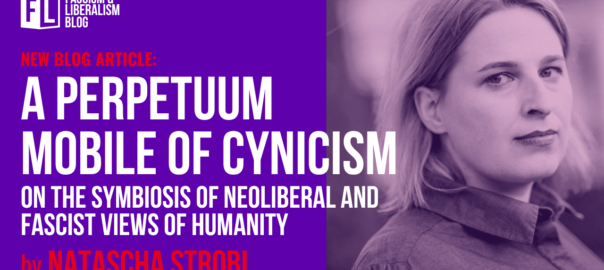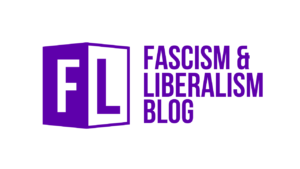A Perpetuum Mobile of Cynicism: on the Symbiosis of Neoliberal and Fascist Views of Humanity
Natascha Strobl
28.08.2025
Economic liberalism and fascism often present themselves as opposites. Fascist forces claim to represent an anti-capitalism that is actually an anti-modernism and economic liberalism sees itself as a bulwark against totalitarianism but, in reality, means anti-communism. Despite all the alleged and actual contradictions, there is a decisive common source of these two ways of thinking: they share a negative image of humanity. Neoliberal capitalism sees individuals in constant struggle with each other. Only through eternal competition can something like innovation or progress come about at all. This idea of competition originates from the structure of the work process and the associated performance ideology and is transferred from there to all areas of society. Starting with the earliest competition for educational places from kindergarten onwards, through living space to relationships and the health sector – every area of society is permeated by acts of competition, selection and the creation of winners and losers.
In neoliberalism, it is important to see the situation of the losers as morally justified and, as a result, to ostracize them from society. Those who do not manage to be among the winners do not deserve to receive any help from society. This is how a neoliberal society produces few winners and many losers. Economically, this can be clearly seen in the ever-increasing concentration of wealth. But it is also visible in the rising potential for frustration in society. The promised goals and markers of prosperity (being able to afford a house, vacation, car) are achievable for fewer and fewer people. In consequence, there are not only more and more people who can be considered ‘losers’ of neoliberalism, they also increasingly feel like such.
The neoliberal, hegemonic ideology frames this as people’s own failure and argues that they don’t deserve it any other way. This neoliberalization of everyday life goes hand in hand with a weakening of democratic institutions, which appear powerless in the face of business and industry influence and consequently act solely in their interests. What remains is a loss of trust in democratic institutions, as well as in (public) media and science. According to sociologist Wilhelm Heitmeyer “authoritarian temptations” thrive, as can be seen in the increasing success of far-right parties and movements.
Life as Constant Struggle
Neoliberalism shares this cynical view of humanity with fascism. Fascism also sees people as beings to be harassed and sanctioned, and who live in constant struggle with each other. The ethnic element adds a further level: Not only individuals, but also peoples, cultures or “races” are in competition with each other and have to assert themselves against each other. Both concepts of humanity are thus united by an essentially Malthusian or Social Darwinist view of humanity. It is about eating or being eaten. Applying this view of humanity to a society means living in constant fear and insecurity of all other people. Solidarity, community and cooperation are not only impossible, but they are also undesirable and portrayed as harmful.
Neoliberalism and Fascism – a Perpetuum Mobile
In countries such as Austria and Germany, the post-war consensus consists of a fragile agreement on democratisation, the promise of political equality, and an economic system based on inequality. Political intervention in the first post-war decades contained the social Darwinist roots of this system. However, from the implementation of neoliberal policies in the 1980s onwards, these roots began to reappear openly. This was accompanied by attempts to reduce democracy, particularly in the world of work. Trade unions and workers’ representatives were disempowered. Neoliberal think tanks and lobbies have formed a kind of state within the state, pursuing opaque policies under the guise of neutrality. Since the 1970s, they have also funded biased research through donations to universities. At the same time, they have set up astroturf organisations and engaged in disinformation and culture war campaigns. Neoliberal protagonists are therefore guilty of the very things they accuse others of. This neoliberal ecosystem is a prime example of how socio-political, authoritarian, right-wing extremist and even fascist agendas naturally accompany their hard economic liberal agendas.
Neoliberalism thus prepares the ground for fascism by hegemonizing a cynical and negative view of humanity. Once it is generally accepted that nothing is guaranteed and that any minimum standard is considered decadent, it is much easier to curtail or abolish regulating institutions. This means rolling back state control and that everyone is being pitched against everyone else. This is precisely the essence of undertakings like DOGE. They dismantle democracy, both discursively and institutionally. The result is a world in which there is no longer any security or trust. Experiences of solidarity are becoming increasingly rare. Everyday life becomes a constant struggle for survival in competition with other people. The tenor is clear: there is not enough for everyone, and you must make sure that you are one of the winners. Nobody is looking out for you, so you don’t have to look out for anyone either.
Fascist Promises
Fascism pushes this precarious state further by affirming and reinforcing it. Our experiences with neoliberalism confirm the fascist view that the world really is as bleak, ruthless and harsh as it has always been claimed to be and at the same time opens up the opportunity to dismiss the left (or what one considers to be the left) as naive dreamers. Neoliberalism destroys the existing order and security, each of which is democratically underpinned. Fascism, on the other hand, offers a promise of order and an authoritarian, hierarchical and elitist security – the authoritarian temptations mentioned above. Without the prior destruction of liberal democracy through neoliberalism, however, fascism would not be possible. Fascism could not prevail on its own, as it has neither the roots nor the resources to do so. It absolutely needs the upheavals and crises of (neoliberal) capitalism in order to gain a mass base at all.
Fascism obtains this mass base through a promise of order, security and value through belonging. In its basic social Darwinist-genocidal attitude, this order can only be achieved through an act of purification. This purification means the ethnic selection of undesirables, be they ethnic, religious or social groups. This selection promises the exclusion of those elements that cause insecurity. These are scapegoats. But even for those who are part of the new order, authoritarian security actually consists of permanent insecurity. You are integrated into a national community from which you can be excluded at any time. In a state of security created through fascism you have to live in constant fear of everyone around you. This shows the negative, cynical and social Darwinist view of humanity shared by neoliberalism and fascism. Everyday life is characterized by insecurity and fear.
Fascism and Capital
However, none of this happens in a vacuum. Fascism becomes an option for capital factions when their own business model, and thus their ability to accumulate capital, is disrupted and cannot be saved democratically. This, for instance, currently applies to the fossil fuel economy: Oil and gas have no future – and that is why these very industries are now pumping money into the neoliberal-fascist ecosystem. Fascism thus becomes a strategy for the persistence of declining or emerging business models. There are also industries that need the support of an authoritarian state because their ability for profit-making is much lower in a democracy. This, for example, also includes the tech industry – be it the social media giants who desire to end all regulation, the surveillance industry or corporations who want to silence debates on the (un)ethical use of artificial intelligence – these business models cannot fully develop in a functioning democracy.
Whether fascism prepares people for capitalism or vice versa is somehow irrelevant — both statements are equally true. Fascism and capitalism are symbiotic systems. They have their own logic and can exist independently, but they benefit from each other and share a common basis. This basis is the education of humans to be compassionless. This lack of compassion is directed towards others, who consequently deserve to die. However, it is also directed inward, meaning, from a neoliberal point of view, one never deserves a life without fear or the right to simply live with dignity. The core of neoliberalism and fascism is therefore a negative view of humanity that does not grant individuals any dignity in their own right but instead categorises and evaluates them according to their performance and usefulness, as well as their ancestry and genetic characteristics.

Natascha Strobl is a political scientist and journalist. She is an expert on right-wing extremism and the New Right. Her book "Radikalisierter Konservatismus. Eine Analyse" was a bestseller and was awarded the Bruno Kreisky Prize for Political Books.
Further Reading
- Heitmeyer, Wilhelm: Autoritäre Versuchungen (2018)
Horkheimer, Max: Die Juden und Europa. Authoritarian State. Reason and self-preservation 1939-1941 (1967)
Polanyi, Karl: The Great Transformation. Political and economic origins of societies and economic systems (1944/1973)

